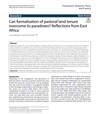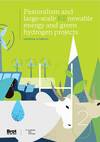This report explores some of the critical challenges that converge at the intersection of climate change and land governance. Some of these challenges are droughts, desertification, disaster risk, land and water management, land degradation and restoration, soil erosion and conservation, biodiversity, and food security.
Year of publication: 2022Organization: Individual authors
Topic: Climate change, Environmental services, Land
Language: English
Type of document: Technical
Geographical coverage: Near East
Legal frameworks for communal land rights in Ethiopia, Kenya, and Tanzania are now gaining momentum. Questions can be raised as to whether, how, and to what extent these frameworks take into account the disadvantages of formalising tenure and the complexities of pastoral resources. In this paper, we consider the impact of these challenges on the formalisation of communal ownership, beginning with an overview of how commons theory has influenced land governance policies and how it is applied to pastoral systems.
Year of publication: 2022Organization: Individual authors, International Livestock Research Institute (ILRI)
Topic: Land
Language: English
Type of document: Technical
Geographical coverage: Eastern Africa
This brief provides methodological guidance on the quantification of animal health interventions and their impact on greenhouse gas (GHG) emissions, on the basis that they deliver multiple benefits to individual farmers and society which could outweigh the costs of the intervention, particularly when considering reduced GHG emissions.
Year of publication: 2022Organization: Food and Agriculture Organization of the United Nations (FAO), Global Dairy Platform
Topic: Climate change, Environmental services
Language: English
Type of document: Technical
Geographical coverage: Global
The project contributed to improving the conditions and productivity of agrosilvipastoral landscapes and the capacity to plan land restoration and manage forest and land resources. Livelihood improvements and concrete positive incidence on household income, food security, crops and milk production, and community interactions. It increased awareness and support policy makers developing intervention strategies that address desertification/land degradation and drought.
Year of publication: 2022Organization: Food and Agriculture Organization of the United Nations (FAO), Individual authors
Topic: Climate change, Economy, Environmental services, Indigenous peoples, Land
Language: English
Type of document: Technical
Geographical coverage: West Africa, Oceania
The study "Valuing, restoring and managing presumed drylands: Cerrado, Miombo–Mopane woodlands and the Qinghai–Tibetan Plateau" confirms the existence of 1 075 million hectares of presumed drylands that are under threat from unsustainable use and climate change. This is in addition to the 6.1 billion hectares of official drylands that already cover 41 percent of the planet’s land surface and are home to 2 billion people. All these areas contain high levels of biodiversity and are home to a large number of people reliant on agriculture to sustain their livelihoods, this is why it's so important to research, analyse and work to protect them. The report contains concrete information on the environmental and ecological value of these dryland areas, and key recommendations for actions to limit land degradation, sustain biodiversity and mitigate climate change.
Year of publication: 2022Organization: Food and Agriculture Organization of the United Nations (FAO)
Topic: Climate change, Environmental services, Food security, Land
Language: English
Type of document: Technical
Geographical coverage: Global
The FAO partnered with the Ethiopian Society of Animal Production (ESAP) to understand and document the various business models along the cattle dairy value chain nodes in Ada’a and Sululta districts. Dairy businesses are highly heterogeneous in Ethiopia and, even though most are profitable, milk production, marketing, service, input and other support are not well organized and integrated. Investments to make the dairy value chain more effective should target more institutional than the technical dimensions, which entails a novel approach for veterinary and animal production services.
Year of publication: 2022Organization: Food and Agriculture Organization of the United Nations (FAO), Individual authors, United States Agency for International Development (USAID)
Topic: Economy, Value addition
Language: English
Type of document: Technical
Geographical coverage: Eastern Africa
This guidance document presents the latest version of the questionnaire, SHARP+ 2020, scoring system and tablet application based on the two technical reviews mentioned above. This document walks the reader through a step-by-step process to set up the SHARP+ assessment, adapt it to the local context, and use it to collect and analyse information about household resilience in the context of climate change. The new material presented is for use by practitioners in the future implementation of SHARP+ in the field.
Year of publication: 2022Organization: Food and Agriculture Organization of the United Nations (FAO), Individual authors
Topic: Climate change, Economy, Resilience
Language: English
Type of document: Technical
Geographical coverage: Global
Large-scale renewable energy projects are being developed in the drylands of Africa, Asia and Latina America without adequate consultation with pastoralists that have been using the land for grazing their livestock since time memorial. This report examines evidence from existing large-scale projects. It argues that an inclusive participatory design of such projects is necessary to safeguard human rights and ensure mutual benefit for pastoralist communities and society at large.
Year of publication: 2022Organization: Heinrich Böll Stiftung, Regional Office for East & Horn of Africa, Individual authors
Topic: Innovation
Language: English
Type of document: Technical
Geographical coverage: Global









